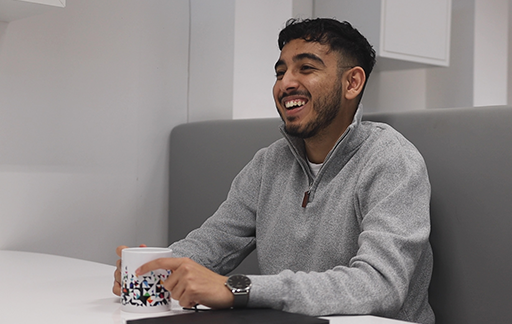.
.
.
.
.
.
.
.

Written by Hamza Bhimani, Consultant
Ramadan is observed and celebrated every year by Muslim's worldwide. It is the ninth month of the Islamic calendar. Ramadan lasts for a month and during this time myself and other Muslim's will not eat or drink (fast) from sunrise to sunset. Ramadan is a time for spiritual reflection and growth, to help those in need, and to spend time with loved ones. Islam's holy month of fasting has been observed for more than 14 centuries , but what does a typical day during Ramadan look like? And how does it fit into the modern day working life? In this article I will take you through my experience of Ramadan whilst working as a consultant at Four.
Ramadan is a commemoration of the month the Qur'an was first revealed to the Prophet Muhammed (SAW). This revelation is known as Laylat al-Qadr (night of power). Fasting is the fourth of the five pillars of Islam and this takes place during Ramadan. It is a time for spiritual reflection and growth, to help those in need, and to spend time with loved ones.
By not being able to eat and drink from sunrise and sunset each day, it helps increase awareness of the hardships that many people in the world go through without food and water, and makes us appreciate the blessings we have in our life.
Ramadan is also a time to get closer to Allah, seek forgiveness for the sins committed, increase on our good deeds and learn compassion and patience in the aim of nourishing your soul, rather than only focusing on your physical body. It is a time for unity as Muslims spend time praying, reciting the Quran, and donating to charity.
Ramadan is the 9th month of the Islamic calendar and usually lasts 29 to 30 days. The exact dates of Ramadan change every year in line with the Islamic Lunar Calendar and the cycles of the moon. Ramadan begins at first new crescent moon sighting, the middle of Ramadan is marked at the sight of the full moon and Ramadan then ends as the moon wanes to the other side. This year Ramadan began in the evening of Friday 1st of April and ended in the evening of Sunday 1st May.
During Ramadan my daily routine changes significantly to an ordinary day, and my sleeping schedule needs to be adjusted. This is what a typical week day looks like for me during Ramadan:
Completing Ramadan whilst working can come with some challenges. I am a Recruitment Consultant and my job requires me to be on the ball, and talking to several clients and candidates throughout the day. Therefore, it can be difficult at times to stay on top form when I have such low energy.
The most difficult thing I find is the lack of sleep due to being up in the middle of the night to eat and pray. This sometimes impacts my performance and concentration throughout the day.
Whilst others have their lunch, it can be difficult with the smell of food going around the office. But it just reminds me about the reasons as to why I am doing Ramadan and the rewards I will be getting from it.
Although there are challenges when fasting in the office, there are some ways around these obstacles to make the experience as easy as possible. When my colleagues eat their lunch, I tend to work through lunch top stay distracted and to avoid thinking about food. Luckily, my employer is very understanding and gave me the option to start work an hour later during Ramadan, which allows me to get an extra hour in bed (which is very important). This may be something worth mentioning to your employer to ask if there are any adjustments they could make to support you during this time.
I find that work actually proves as a welcome distraction to the feeling of hunger and thirst. I would consider myself a morning person and thus, I try and get through as much work as I can, as quick as I can before hitting a mental block. This normally occurs at 3pm as this is when I tend to lose focus and concentration. Overall, it's important to find what works for you and adapt to new ways of working during Ramadan.
Eid al-Fitr, commonly referred to as Eid marks the end of Ramadan. This is a celebration of breaking the fast. Eid is a huge event that celebrates the end of the fasting period (Ramadan). It is a day of treats, gifts, food and games to congratulate everyone on completing Ramadan successfully and rewarding all their efforts. It is a time for family to get together and spend the joyous day with loved ones, including friends.
This year I celebrated Eid with my family (mum, dad and brother) and my fiancé. Woke up at 10am to shower, get ready (put my thobe on) and ate something sweet (tradition) before going to the mosque for a massive congregation for Eid prayers. Once prayers are complete, we officially commenced the celebration of Eid by going back home and having an indulgent breakfast with the family. We exchanged gifts and played some games before having lunch. Then we usually spend the rest of the afternoon talking, catching up, having tea, sweets and snacks. Before ending the evening with desserts such as cake, pastries and biscuits.
Eid really reinforces the true reason why we complete Ramadan each year and how we are rewarded for our discipline and the sacrifices we make.
Share: